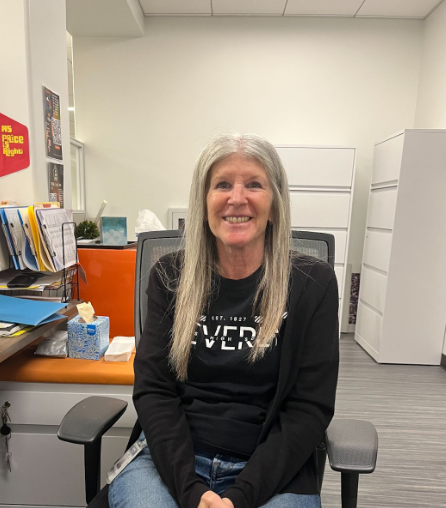Vivian Geilim opinion editor
Jason Harward editor-in-chief
Dr. Steven Rubenstein, the longtime teacher of AP Literature, has had a unique past before choosing to become a teacher. After a few years teaching a screenwriting class at Bucknell University (a course responsible for the screenplay of “Kubo and The Two Strings” and the production of “American Pie”), Rubenstein decided to follow the advice he had given to many students and enter the movie industry.
Rubenstein began his career in Hollywood as a reader–reading new scripts and informing the production company of their merit–and later moved into the executive sphere. He received a production credit on a handful of movies, notably the teen classic “John Tucker Must Die.”
After his 10 year career in Hollywood came to a close, Rubenstein was hired at Beverly, where he brings his experience with story and literature to the high school curriculum.
What did you want to do when you were growing up?
When I was growing up, the big dream was not to write for Hollywood but was to write the great American novel. I think I wanted to be a novelist and so in graduate school, my specialty was 19th century novels. I went into that specifically because I thought, ‘Oh, I’ll read a lot of novels and I’ll become a novelists.’ That’s not really how that works.
What movie or set of movies made you think of being in the movie industry?
Brian De Palma was making movies like “Dressed to Kill” and “Body Double,” and I loved Alfred Hitchcock too. Hitchcock and De Palma really inspired me in my love of movies and [made me] want to go into the movie business.
What were your expectations for Hollywood and what is it actually like?
It’s a hard business and when I went into it, I didn’t actually know what people did on a daily basis. I thought that it would be working with writers and working on ideas and things like that, but most of your day is actually spent talking on the telephone and going out to eat, which can be fun! The other thing is, actually, it’s really all about selling. Selling ideas, selling stories and in that way, I totally didn’t anticipate that it was about figuring out how to sell something to someone and everybody is selling.
How did you come across “John Tucker Must Die” and what were your thoughts on it?
So I had very specific ideas about John Tucker. I liked how it was kind of “[The] First Wives Club” with Bette Midler and Diane Keaton and Goldie Hawn. I felt like it was “The First Wives Club” in high school and I liked that it was a story of girls’ empowerment, kind of turning the table on the guy who’s used all of them like Kleenex. And in the original screenplay, all the girls were on the cheerleading squad and so one of the things that we decided to do was make this a diverse group of girls at the high school. And so then, you know, we developed it with the writer and then went out to look for directors.
Did you ever watch it just to experience it as a viewer?
No, I haven’t seen it since it came out.
Do you watch movies differently than the average Joe?
Oh, absolutely. With the knowledge of the structure, I mean I can still enjoy the movies that I watch but I’m very much aware of the mechanics of the story.
Is the book always better than the movie?
I don’t know if that’s always the case [books being better than the movie.] There are definitely some books that are just really difficult to translate into a film. Like we read “Don Quixote” and it’s hard to figure out how to get Cervantes’s and the narrator’s perspective on the story and how do you put that into a movie? I think it’s hard to capture Austen’s ironic narrator in a film, but I think the Ang Lee film of the book is excellent. I think there’s a trade off. And every once and a while, there’ll be a movie that was better than the book.
With all of the spotlight on the scandals in Hollywood, did you ever see anything like that?
I never saw anything, but everybody knew about it. Not just Harvey Weinstein, but all of the bosses; everybody knew which bosses were abusive to the women working for them. It was an open secret in Hollywood. Sadly, people just took it for granted that it was how things were done. The whole cliche about the casting couch was a longstanding one that is now viewed as completely unacceptable. It’s a good thing that all of that is coming out.
Movie recommendation by Rubinstein:
Ladybird, 2017, written and directed by Greta Gerwig
Election, 1999, novel by Tom Perrotta, screenplay by Alexander Payne and Jim Taylor, directed by Alexander Payne
Being John Malkovich, 1999, written by Charlie Kaufman, directed by Spike Jonze
Scream, 1996, written by Kevin Williamson, directed by Wes Craven
The Godfather, 1972, novel by Mario Puzo, written and directed by Francis Ford Coppola
The French Connection, 1971, novel by Robin Moore, screenplay by Ernest Tidyman, directed by William Friedkin
Categories:
Steven Rubenstein: a taste of teaching and entertaining
April 30, 2018
1
Tags:
Donate to Highlights
$125
$1000
Contributed
Our Goal
Your donation will support the student journalists of Beverly Hills High School. Your contribution will allow us to purchase equipment and cover our annual website hosting costs.
More to Discover




























